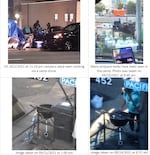This is Part 1 of a three-part series.
This past August, John DiLorenzo, one of Portland’s most prominent attorneys, decided he wanted something done about the homeless encampment on Southwest 12th Avenue and Southwest Taylor Street.
The historic apartment building he co-owns, The Gentry, was just across the street. DiLorenzo said his tenants had complained about gunshots and drug deals at the camp all summer long.
So had nearby property and business owners, who were filing a deluge of complaints to any city official they could find. The owner of a diner a block to the east said she had called the police twice in two days, the second time for a woman possibly overdosing and flailing on the cement “like a fish.” Representatives for the Medical Dental Building on Southwest 11th Street had taken to reporting the camp to the city’s online portal weekly, sometimes daily, over their frustrations at a sidewalk littered with trash and needles.
The city’s power brokers, many of whom owned property nearby, were sending increasingly exasperated emails to the mayor’s office. Real estate developer Mark New warned the mayor’s staff in August that “these guys are digging in” with “a full kitchen set up ... a cooktop and propane tanks, a few couches and a drive through drug store,” according to emails obtained by OPB.
Yet nothing changed. The campsite ranked low on the priority list of a city where tents can be found on many downtown blocks and police say they’re overextended responding to a record number of homicides. The diner owner who dialed 911 said she waited over an hour and a half each time for police to arrive before giving up.
So DiLorenzo gave the city a push.
In mid-August, he hired private security company Echelon Protective Services to carry out a weekslong investigation into potential criminal activity at the campsite. DiLorenzo said a cohort of nearby property owners pitched in to pay, but he declined to say the cost.

A report by Echelon Protective Services documents the activities at a large campsite at Southwest 12th Avenue and Southwest Taylor Street in Portland. A group of property owners banded together to hire the firm, and investigate potential criminal activity.
via City of Portland Public Records Request
The resulting 46-page dossier, obtained by OPB through a records request, detailed alleged illegal activity — what investigators deemed evidence of drug dealing, prostitution and human trafficking within the camp — as well as more innocuous aspects of the residents’ lives: their visitors, their romantic entanglements, the extent of ash accumulated in their barbecue.
DiLorenzo said he felt outsourcing the investigative work was the rational thing to do.
“When the tenant of your apartment house is concerned about a gunshot from across the street, I think any responsible property owner is going to try to investigate it or do something about it,” he said. “Don’t you?”
As business and property owners become increasingly frustrated with Portland’s public safety system, they are tapping private security to fill the vacuum — and perhaps no company has benefited more than Echelon. The firm investigates suspected crimes. Clients say guards patrol within an Old Town perimeter that stretches from Union Station to Southwest Ash Street. Business owners say they have been so satisfied with the company’s performance that they’ve reprogrammed their burglar alarms to ping Echelon — not 911 — if there’s a problem.
But while businesses and property owners may treat private security firms such as Echelon like a public safety agency, state law does not. Private security firms in Oregon are notoriously underregulated, and their employees are required to receive a fraction of the training and oversight as public law enforcement. They remain accountable primarily to their clients, not the public.
The result: Across the city, private security firms — even the most highly regarded ones — are thrust again and again into a public safety role for which they are not prepared.
Over a hundred pages of police records reviewed by OPB show that, in the last year and a half, Echelon guards have batoned a homeless woman and torn apart a homeless camp without reporting the incidents, tried to kick sleeping campers off a public sidewalk without legal grounds to do so, and repeatedly made demonstrably false statements to law enforcement. The Multnomah County District Attorney’s office will no longer bring charges in any criminal case that hinges on testimony from Echelon guards without substantial evidence that can “assure the accuracy of their statements.”
That skepticism, however, has yet to reach Portland City Hall.
On Oct. 12, DiLorenzo sent Sam Adams, an aide to Mayor Ted Wheeler and a former mayor himself, the Echelon report. The document recommended the camp at Southwest 12th and Taylor “be dissolved immediately.”
Two weeks later, it was.
How Echelon racked up customers
The rise of Echelon downtown can be traced back to one woman.
By summer 2020, Tiffany Hammer, a member of the Old Town Community Association and the Portland Public Safety Action Coalition, was convinced the neighborhood was unraveling. Break-ins and vandalism were on the rise. The pandemic had further isolated the city’s most vulnerable, and their lives were falling apart in front of her. She was seeing more needles and more people wandering the street in clear mental health crises. She started keeping a count of the rising number of tents.
The city, she felt, was unresponsive to her pleas for assistance. So she hired Portland-based Echelon Protective Services in July to create what she envisioned as a new model of private security — a far cry from the sluggish mall-cop stereotype that can taint the industry’s image. Instead of huddling in their cars or doorways, she said she wanted guards actively patrolling the area, protecting businesses while also assisting the people living in tents outside them.

Tiffany Hammer, center, and an Echelon Security employee, right, joined with Union Gospel during the heat wave to help folks relocate to shelters and cooling centers, and hand out water. Hammer envisioned a new model of private security — guards actively patrolling the area, protecting businesses while also assisting the people living in tents outside them.
Courtesy of Tiffany Hammer
“I wanted a new type of private security — something that hasn’t been done before,” she said. “There’s no other model like this in Portland.”
At the time, Echelon — owned by Pacific Green Protection Inc. — was a year-and-a-half old. After interviews with several companies, Hammer hired the fledgling business to start what she refers to as the “Pacific-Echelon model.”
By September 2020, she said Echelon had gone from having minimal presence downtown to over 40 clients. Each “individual ratepayer,” she said, has a unique contract that they hold directly with Echelon, though each agreement emphasizes outreach with people experiencing homelessness. Most business and property owners find out about the “coalition” of Echelon clients through word of mouth. She said she can no longer keep track of everyone who has joined.
She describes the arrangement as a more outreach-focused Downtown Clean & Safe, the controversial 213-block enhanced services district in the central city. Under that arrangement, all property owners in the area must pay an annual fee to the city, which contracts with a nonprofit to provide additional security and cleaning services on top of what the city already does.
The differences between the two extend beyond the outreach component. Downtown Clean & Safe is overseen by the city. Its contract is posted online, and the public can find out who pays into the district — and how much they pay — with a simple records request. According to the newest contract, city officials must get a monthly report of any complaints filed against guards and any uses of force. They can audit the district whenever they feel like it.
The Echelon consortium, Hammer emphasizes, is inherently private: It’s private businesses using their own money to pay for their own security.
Hammer said the partnership is intentionally designed to guard the privacy of businesses and shield them from public scrutiny. She declined to say how much she pays for Echelon’s services.
“What I can tell you is, when I look around the room, everybody in that whole ecosystem down there uses Pacific Echelon,” she said. “Even the nonprofits.”
A who’s who of clients
The company has earned a sterling reputation amongst downtown business and property owners as the go-to for highly skilled private security. Their client list is a roster of civic heavy-hitters. The head of the Downtown Development Group, one of the largest landowners in Portland, has used them. So have the University of Oregon, the Lan Su Chinese Garden and Harsch Investment Properties. One of the commercial real estate company’s vice presidents told the mayor’s office in September that the number of downtown blocks they’re “having to privately secure has grown into the teens” as they “fight off the onslaught,” according to an email obtained by OPB.
Under the “Pacific Echelon” model, clients say they don’t need a guard to hover by their building. With so many clients clustered in the city’s core, guards can patrol a large swath of Old Town that encompasses many of their contracts — akin to a foot patrol.
“Essentially how neighborhoods used to have a walking beat because they could get to know everybody and then it was easier to mitigate stuff, that’s what Echelon does,” said Jessie Burke, the owner of the Society Hotel. “They’re in the neighborhood, walking the whole neighborhood, all the time. That’s why they know everybody.”
Before Burke calls the police, she said, she will always call Echelon. She said their guards are fast and responsive, and they treat downtown Portland’s growing homeless population with compassion. When a naked woman began licking a Society Hotel window in front of guests, Burke said guards were able to gently get her to move by making her a peanut butter and jelly sandwich.
The owner of Echelon says he has been homeless twice. Alex Stone did not make himself available for an interview, but wrote in an email that his company gives away “thousands of dollars of goods to our houseless neighbors” each week, including medical kits, sharps containers, tents, sleeping bags, clothing, food and water. He said the company will pay for people’s Ubers to get to hospitals and shelters.

A screen shot of the Echelon Protective Services website, highlighting their values and goals.
Screenshot / Pacificechelon.com
Echelon staff often direct people to Bybee Lakes Hope Center, a new shelter in the former Wapato Jail. Its founder, Alan Evans, said Echelon is a “very active” partner and refers a couple of people each week. Burke said Echelon staff will also text her to see if she can spare a room and offer to pay.
Burke is blunt: Portland has put itself in “an atrocious situation” with a cohort of private businesses running what amounts to its own police force. But she said she cannot wait for the city to figure out how to run its own police department.
“Private sector is like, ‘Hey, you still need order,” she said. “So you fill the gap yourself, privately. Right now we pay taxes for police, we pay, in our 213-blocks where Clean & Safe is, an additional tax, and we pay for private security.”
Since hiring Echelon in December 2020, officials at the Lan Su Chinese Garden have expanded their contract and now pay roughly $16,000 each month for both a “roving” patrol and a “static” guard who stays by the garden. Like Burke, Lan Su head Elizabeth Nye feels uneasy about the area relying so heavily on paid guards. Also like Burke, she doesn’t see an alternative.
Since late October, Nye said, the Lan Su Garden was broken into six times — three times in this past week alone. The museum is now looking into how to install “riot glass within a Chinese architecture context.”
“There’s just a massive public safety breakdown,” Nye said. “I don’t think this is a system anyone would have designed.”
It’s a system, clients concede, with little accountability.
By the end of 2020, unbeknownst to business and property owners, allegations of abuse and misconduct were stacking up.
Around the time the Lan Su Garden hired Echelon, the police received a tip related to the company.
After months of taking on the role of a city service, the tipsters alleged, guards had done something even the city cannot: Sweep away a homeless camp with no notice.
Part 2, coming Thursday: Businesses and property owners in downtown Portland were thrilled with Echelon’s performance. But to some in law enforcement, the power of private security guards, and the lack of accountability, has become a problem with no clear solutions.

